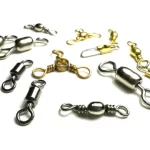When planning a fishing trip in some of America’s most remote and pristine fishing spots, anglers should remember that these locations are often prime bear habitat. Whether you’re fishing in the dense forests of the Appalachian Mountains or the rugged wilderness of Alaska, you could encounter black bears or even grizzlies. With these encounters, the risk of danger increases, especially since anglers often target the same fish that bears seek out.
Understanding Bear Behavior and Habitats
In North America, black bears and grizzly bears are the two species most anglers are likely to encounter. Black bears are widespread, found across forested and mountainous regions, including the Rocky Mountains and Appalachians. With a population of approximately 600,000, they are the more common species. Black bears tend to be smaller and are often considered “nuisance” bears, known for rummaging through garbage and causing disturbances near human habitats.
Grizzly bears, which are a subspecies of brown bears, are less common but much larger and potentially more dangerous. These bears inhabit regions like Alaska, Wyoming, Montana, and parts of Idaho and Washington. Unlike black bears, grizzlies are less likely to be found near human populations and are more frequently encountered in remote wilderness areas. Grizzlies are particularly active during the fall as they prepare for hibernation, coinciding with prime fishing seasons in many areas.
Essential Bear Safety Tips for Anglers
When fishing in bear country, preparation and awareness are key to staying safe. Here are some essential tips:
- Make Noise and Stay Visible: Bears tend to avoid humans, and often, they’ll move away if they hear you coming. Travel in groups, talk loudly, or wear bear bells to alert any nearby bears of your presence. If you’re alone, making regular noise as you move through dense vegetation can help prevent a surprise encounter.
- Be Alert: Constant vigilance is crucial in bear country. Periodically scan your surroundings while fishing, particularly in areas with limited visibility. Choose open spots with a clear line of sight, giving you ample time to react if a bear approaches.
- Carry Bear Spray: Bear spray is a highly effective deterrent against aggressive bears. Keep it accessible at all times, and practice using it so you can deploy it quickly and accurately in an emergency. Bear spray is most effective when used at close range, so ensure you’re comfortable with how to use it under pressure.
- Secure Your Catch: Bears are attracted to the smell of fish, so if you keep any, store them in sealed plastic bags and in a bear-proof container, far from your camp or car. If possible, clean your fish at home to avoid spreading scent in bear territory. If a bear approaches while you have a fish on the line, consider cutting the line and retreating.
- Stay Away from Bears: If you spot a bear, maintain a safe distance. Never approach, and give it plenty of space to move away. Stay calm, speak in a firm voice, and slowly back away. Avoid making sudden movements or turning your back on the bear.

Handling Aggressive Bear Encounters
Despite all precautions, there’s a possibility of encountering an aggressive bear. If you find yourself in this situation, remain calm and avoid running. Running can trigger the bear’s instinct to chase. Instead, try to make yourself appear larger by raising your arms and speaking loudly. If the bear continues to approach, prepare to use your bear spray. Spray a cloud of the deterrent between you and the bear, aiming for its face as it gets close.
If the bear makes physical contact, the best response depends on the bear species. For grizzlies, playing dead by lying face down with your hands protecting your neck can sometimes defuse the situation. For black bears, fighting back is often more effective since they are more likely to be driven off by resistance.
Fishing in bear country requires more than just angling skills; it demands a solid understanding of bear behavior and a commitment to safety practices. By staying vigilant, making noise, carrying bear spray, and knowing how to react in an encounter, you can significantly reduce the risk of a dangerous situation. Remember, your goal is to enjoy your time on the water while ensuring that both you and the bears remain safe.
Image/Source: WOS





